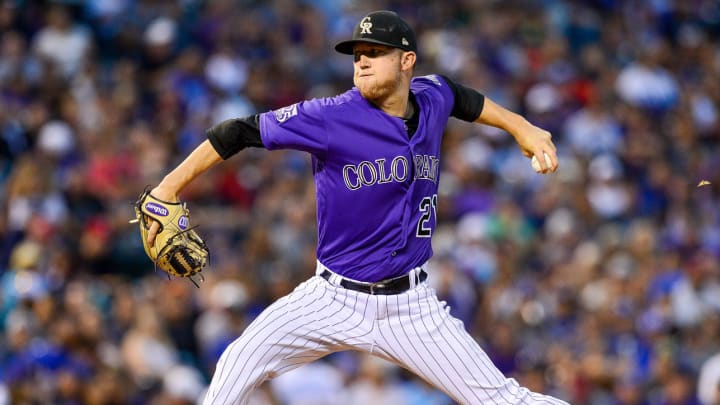It's Time We Applaud Rockies Starter Kyle Freeland Even if He Won't Win the Cy Young

Amid the dominant seasons of Jacob deGrom, Max Scherzer and Aaron Nola, it’s easy to overlook the surprisingly stellar year of Rockies lefty Kyle Freeland. Unlike the aforementioned trio of National League aces, Freeland doesn’t have a miniscule ERA like deGrom, a shelf at home already full of trophies like Scherzer, or a top prospect pedigree like Nola. What he’s done, though, is perhaps more impressive: He’s figured out how to survive as a pitcher in Coors Field.
The unforgiving environs of Colorado’s mile-high stadium have bedeviled pitchers since the gates on Blake Street first opened in 1995. That season, Rockies hurlers posted a collective 4.97 ERA, third worst in the majors; the rotation’s mark was a ghastly 5.19. Those results have repeated with unpleasant regularity in the two decades since: Over the last 23 seasons, Colorado has finished in the bottom five in team ERA 17 times, including dead last in five separate years.
To be a Rockies starter is to inherit a legacy of failure. No one—not expensive free agents or established veterans or high draft picks—has been able to succeed at altitude. That’s something Freeland knows first-hand: Born in Denver in 1993, he grew up a Rockies fan. His formative baseball years were spent watching pitchers try and fail to navigate the physics-shattering thin air of Colorado in the peak of the Steroid Era.
Maybe it’s fitting, then, that it’s Freeland who has seemingly mastered the hardest task a pitcher faces in the majors, short of retiring Mike Trout. On Sunday, he blanked the Diamondbacks over seven innings to finish off Arizona’s postseason hopes. In the process, he burnished his NL Cy Young case: On the season, he now has a 2.84 ERA, 165 ERA+ and 7.9 Wins Above Replacement (Baseball-Reference version) in 196 1/3 innings. But even more impressively, he’s conquered Coors. In 14 starts and 87 2/3 innings at home, he’s posted a 2.36 ERA there—the lowest of any Rockies pitcher with 80 or more innings at home in franchise history.
By that stat alone, Freeland represents a triumph for the Rockies, who have only seen one other pitcher—veteran lefty Jorge De La Rosa, back in 2013—post an ERA below 3.00 over 80 frames at home. Of the 52 individual pitching seasons that have featured 80-plus innings in Coors, only 14 saw the starter get under even the 4.00 mark in ERA. What Freeland’s doing isn’t just historic; it’s a miracle.
So what’s Freeland’s secret? Nothing stands immediately out in his profile. His strikeout rates are unexceptional: 7.75 per nine, or 20.7% of plate appearances against him—both below the league average of 8.5 and 22.2, respectively. His velocity is unassuming, with his four-seam fastball clocking in at 91.7 mph. His control is fine but unspectacular, with a walk rate (8.5%) just above league average (8.4). Nor is he a former top prospect making good. He was the No. 8 pick of the 2014 draft, but Freeland appeared on top-100 lists only once in his minor league career, before a 2015 season that saw him get hurt, pitch just 46 2/3 innings, and fall off the radar.
But there are things that help explain Freeland’s success. He keeps the ball out of the air, ranking 20th in the majors among qualified pitchers in ground-ball rate at 46.3%. He routinely gets soft contact, with an average exit velocity against of 86 mph that slots in 33rd among the 296 pitchers with 150 or more batted balls off of them (and he ranked in the top five percent of MLB in that stat last year, at 84.5 mph). He’s also given up only 17 home runs on the year, with a home run-per-nine rate of 0.78 that’s eighth lowest in the league.
Freeland has also tinkered with his arsenal over the last year, largely ditching his sinker and increasing the usage of his changeup. The former was ineffective in 2017, with opposing batters hitting .321 against it with a .465 slugging percentage; so was the latter, clocking in at .387 and .484. That sinker was Freeland’s primary option against righthanded hitters in 2017, but this year, he’s leaned more on his four-seamer against righties, as well as doubled his changeup usage against them. The results have been far better: Righties put up a .387 average against Freeland’s changeup last year, but in 2018, that’s dropped to .284. All together, righthanders have lost over 100 points in OPS against him, from .803 in 2017 to .696 this season.
All of that adds up to the best season a Rockies starter has ever had. Freeland’s 7.9 bWAR tops Ubaldo Jimenez’s 7.5 in 2010—when he finished third in that year’s Cy Young voting—as the most put up while wearing purple and black, and his 165 ERA+ narrowly edges out Jimenez’s 161 that season.
Beyond that, Freeland represents a rare victory for the Rockies in terms of player development: a homegrown ace. Colorado has burned several first-round picks looking for that elusive No. 1 starter: Jeff Francis in 2002, Chaz Roe in ’05, Greg Reynolds (with the No. 2 pick, ahead of Clayton Kershaw, Tim Lincecum and Scherzer, among many others) in ’06, Casey Weathers in ’07, Christian Friedrich in ’08, Tyler Matzek in ’09. None of them panned out—save Francis briefly, before injuries brought him down—until now.
But Freeland is not only excelling as a product of the farm system, but also leading a rotation comprised of nothing but pitchers plucked and groomed by the Rockies the entire way. Freeland, Jon Gray, German Marquez, Tyler Anderson, Chad Bettis and Antonio Senzatela have all been Rockies for life (with Gray and Anderson as fellow first-rounders). And while all have had their struggles in their life in Coors, that group has shown promise. Marquez has a 3.91 ERA and 120 ERA+ over 184 1/3 innings this season, and Gray has 175 punchouts in 163 1/3 frames, albeit chained to a 5.07 ERA and 1.4 homers per nine. For years, Colorado has struggled to build a rotation in any form at all; now, the team may finally have young arms to dream upon.
Were it not for deGrom, Scherzer and Nola, the Rockies would have something even more improbable than a homegrown starting five: a Cy Young winner based in Coors. But it’s hard to see how Freeland, even with his strong season, can beat anyone in that troika. Fittingly, he ranks fourth in the NL in bWAR, ERA+ and ERA, falling in behind deGrom, Scherzer and Nola in all three categories. (He’s also fourth in wins with 16, fifth in innings pitched, and sixth in Win Probability Added.) His case rests largely on the degree of difficulty he faces, though even there, deGrom has him beat, stuck as he is pitching for a woeful Mets team that gives him zero run support.
If anything, Freeland’s chances seem better for another award: the NL MVP. That may seem counterintuitive: If Freeland isn’t good enough to be the Cy Young, how could he be worthy of MVP honors? But you can build a winning narrative around his importance to his team. At 85–70, Colorado is in the thick of the NL West and wild-card races and wouldn’t be anywhere close to first place in either without Freeland atop the rotation. He’s been the best player on a flawed squad that is nonetheless in contention. That’s admittedly a shaky platform, built as it is upon the idea that MVP trophies should go to players having good years on contenders instead of simply the best season overall. But with the meaning of the award always up for debate and open to interpretation, and with no position players having obvious superstar campaigns, Freeland is MVP material if you squint and tilt your head just right.
Regardless of whether he brings hardware home, though, Freeland can lay claim to something even more special: being the pitcher who dominated Coors Field, instead of the other way around. Now we wait to see if he’ll get a shot to do that in Game 1 of a Division Series or a wild-card game in Colorado—maybe the first time ever Rockies fans could see a pitcher stride out to the mound in Denver and not prepare for the worst.
